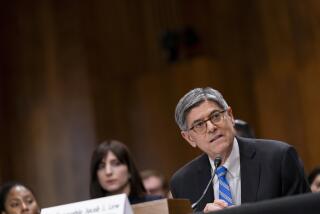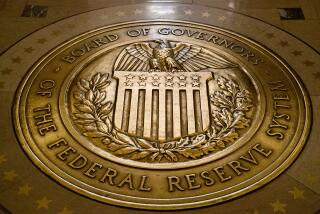Exactly What the World Bank Needs
- Share via
President Bush’s nomination Wednesday of neoconservative Deputy Defense Secretary Paul Wolfowitz to run the World Bank is predictably infuriating critics of the Iraq war. Already Wolfowitz is being likened in the New Republic and elsewhere to Robert McNamara, the Vietnam War architect who went on to mismanage the World Bank and mire the Third World in billions of dollars of debt.
But nothing could be more mistaken: As World Bank head, Wolfowitz would be far more likely to reverse rather than extend McNamara’s legacy.
Though its origins are seldom remembered today, the bank was founded after World War II as a way of promoting New Deal-style state capitalism -- a kind of Tennessee Valley Authority for the world, aimed at creating investment in risky countries south of the Equator.
As the years passed, however, it became something quite different. First, in the late 1950s, development experts decided that socialist states would be the best at fostering development. Swedish economist Gunnar Myrdal, later a Nobel laureate, said in 1956: “The special advisors to underdeveloped countries who have taken the time and trouble to acquaint themselves with the problem ... all recommend central planning as the first condition of progress.” Such nonsense only ended up harming the countries the bank was supposed to assist, while enriching the Third World elites who skimmed off its loans.
In the bank’s early days, it was cautious about making enormous loans. But during McNamara’s tenure, between 1968 and 1981, that caution was set aside. Famous for having relied on body-count statistics in the Vietnam War, McNamara brought his bean-counting approach to the bank. His credo was that the more money the bank lent, the more effective it was. So he went on a lending spree, the effect of which was to create billions of dollars of debt, prop up dictatorships in Ethiopia and Mozambique, and pay for shoddy roads and useless steel factories. McNamara made no distinction between democratic and authoritarian countries; Tanzania’s Julius Nyerere was a favorite of his.
Although the left has recently revved up its attacks on the bank as an exploiter of Third World countries, neoconservatives have offered their own blistering critique of its performance for several decades. While the left sees the bank as a tool of capitalism, neoconservatives argue that it has not been enough of one. It was London School of Economics professor P.T. Bauer (who influenced Daniel Patrick Moynihan and other American neoconservatives as well as libertarians from the Cato Institute and elsewhere) who first blew the whistle on the reigning development experts. Long before the concept was accepted, he declared that free markets, private property and the rule of law were the keys to development. His studies of traders in West Africa showed that not receiving aid was vastly more beneficial than going on a kind of international dole. Countries needed a foreign market, not handouts.
More recently, American Enterprise Institute scholar Nicholas Eberstadt has gone a step further, calling for privatizing the bank.
Under the leadership of current chief James Wolfensohn, who took over in 1995, the bank started to shift away from massive loans that built useless dams and highways. But Wolfensohn was wrong to fight against proposals for giving outright grants to poor countries that need help. As someone who is not a professional development expert, Wolfowitz can break with orthodoxy and shake up the moribund bank, which plainly is what President Bush wants.
Coming on the heels of his nomination of John Bolton as U.S. ambassador to the United Nations, it is clear that Bush hopes to challenge the giant international institutions that have for decades propped up Third World dictatorships. With his ideas and idealism, Wolfowitz could force the bank to promote democracy.
It’s not as though he’s a naif when it comes to international diplomacy. Not only did Wolfowitz serve in the Reagan State Department, he was also ambassador to Indonesia, where he garnered valuable experience in negotiating aid grants. Wolfowitz’s first moves should be to begin replacing loans with grants and to persuade the West to forgive existing debt.
Wolfowitz’s biggest test may be earning acceptance -- not in the Third World but the Old World. Europeans, already horrified by the nomination of Bolton, another neoconservative, may seek to block Wolfowitz.
But it would be a shame if they let pique over the Iraq war scuttle his bid. Wolfowitz, who has always despised McNamara’s technocratic approach, may be the right candidate to revive an ailing institution that almost seems to have outlived its usefulness.
More to Read
Sign up for Essential California
The most important California stories and recommendations in your inbox every morning.
You may occasionally receive promotional content from the Los Angeles Times.










